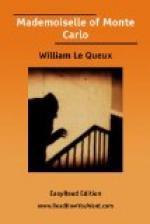The house was one of those great old ones built in the days of the First Empire, with a narrow entrance and square courtyard into which the stage coaches with postilions rumbled before the days of the P.L.M. and aircraft. In the Napoleonic days it had been the residence of the Dukes de Vizelle, but in modern times it had been converted into a series of very commodious flats.
The Sparrow, sprightly and alert, stood, after taking his cafe au lait, looking down into the courtyard. He had been reading through several letters and telegrams which had caused him some perturbation.
“They are playing me false!” he muttered, as he gazed out of the window. “I’m certain of it—quite certain! But, Gad! If they do I’ll be even with them! Who could have given Henfrey away in London—and why?”
He paced the length of the room, his teeth hard set and his hands clenched.
“I thought they were all loyal after what I have done for them—after the fortunes I have put into their pockets. Fancy! One of them a well-known member of Parliament—another a director of one of the soundest insurance companies! Nobody suspects the really great crooks. It is only the little clumsy muddlers whom the police catch and the judge makes examples of!”
Then crossing back to the window, he said aloud:
“Lisette ought to be here! She was due in from Toulouse at nine o’clock. I hope nothing further has happened. One thing is satisfactory—young Henfrey is safe.”
As a matter of fact, the girl had spoken to The Sparrow from her hotel in Toulouse late on the previous night, and told him that her “friend Hugh” was in Marseilles.
Even to the master criminal the whole problem was increasingly complicated. He could not prove the innocence of young Henfrey, because of the mysterious, sinister influence being brought to bear against him. He had interested himself in aiding the young fellow to evade arrest, because he had no desire that there should be a trial in which he and his associates might be implicated.
The Sparrow hated trials of any sort. With him silence was golden, and very wisely he would pay any sum rather than court publicity.
Half an hour went past, but the girl he expected did not put in an appearance.
Monsieur Gautier—the man with the gloved hand—was believed by his old housekeeper to be a rich and somewhat eccentric bachelor, who was interested in old clocks and antique silver, and who travelled extensively in order to purchase fine specimens. Indeed it was by that description he was registered in the archives of the Surete, with the observation that notwithstanding his foreign name he was an Englishman of highest standing.
It was never dreamed that the bristly-haired alert little man, who was so often seen in the salerooms of Paris when antique silver was being sold, was the notorious Sparrow.
Lisette’s failure to arrive considerably disturbed him. He hoped that nothing had happened to her. Time after time, he walked to the window and looked out eagerly for her to cross the courtyard. In those rooms he sometimes lived for weeks in safe obscurity, his neighbours regarding him as a man of the greatest integrity, though a trifle eccentric in his habits.




